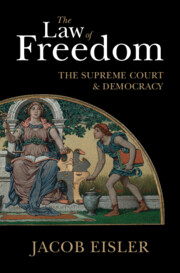Book contents
- The Law of Freedom
- The Law of Freedom
- Copyright page
- Dedication
- Epigraph
- Contents
- Preface
- Acknowledgments
- Introduction
- 1 The Counterpopular Dilemma
- 2 Constitutionalism and the Counterpopular Dilemma
- 3 Traversing the Dilemma
- 4 One Person, One Vote
- 5 Campaign Finance
- 6 Parties in Democracy
- 7 Race and Elections
- Conclusion
- Selected Bibliography
- Index
Introduction
Published online by Cambridge University Press: 06 July 2023
- The Law of Freedom
- The Law of Freedom
- Copyright page
- Dedication
- Epigraph
- Contents
- Preface
- Acknowledgments
- Introduction
- 1 The Counterpopular Dilemma
- 2 Constitutionalism and the Counterpopular Dilemma
- 3 Traversing the Dilemma
- 4 One Person, One Vote
- 5 Campaign Finance
- 6 Parties in Democracy
- 7 Race and Elections
- Conclusion
- Selected Bibliography
- Index
Summary
The Supreme Court has been at the center of great upheavals in American democracy across the last seventy years. From the end of Jim Crow to the rise of wealth-dominated national campaigns, the Court has battled over if democracy is an egalitarian collaboration to serve the good of all citizens, or a competitive struggle by private interests. In The Law of Freedom, Jacob Eisler questions why the Court has the moral authority to shape democracy at all. Analyzing leading cases through the lens of philosophy and social science, Eisler demonstrates how the soul of election law is a battle between two philosophical understandings of democratic freedom and popular self-rule. This remarkable book reveals that the Court’s battle over democracy has shaped how Americans rule themselves, marking election law as the most dramatic judicial intervention in constitutional history.
- Type
- Chapter
- Information
- The Law of FreedomThe Supreme Court and Democracy, pp. 1 - 28Publisher: Cambridge University PressPrint publication year: 2023

